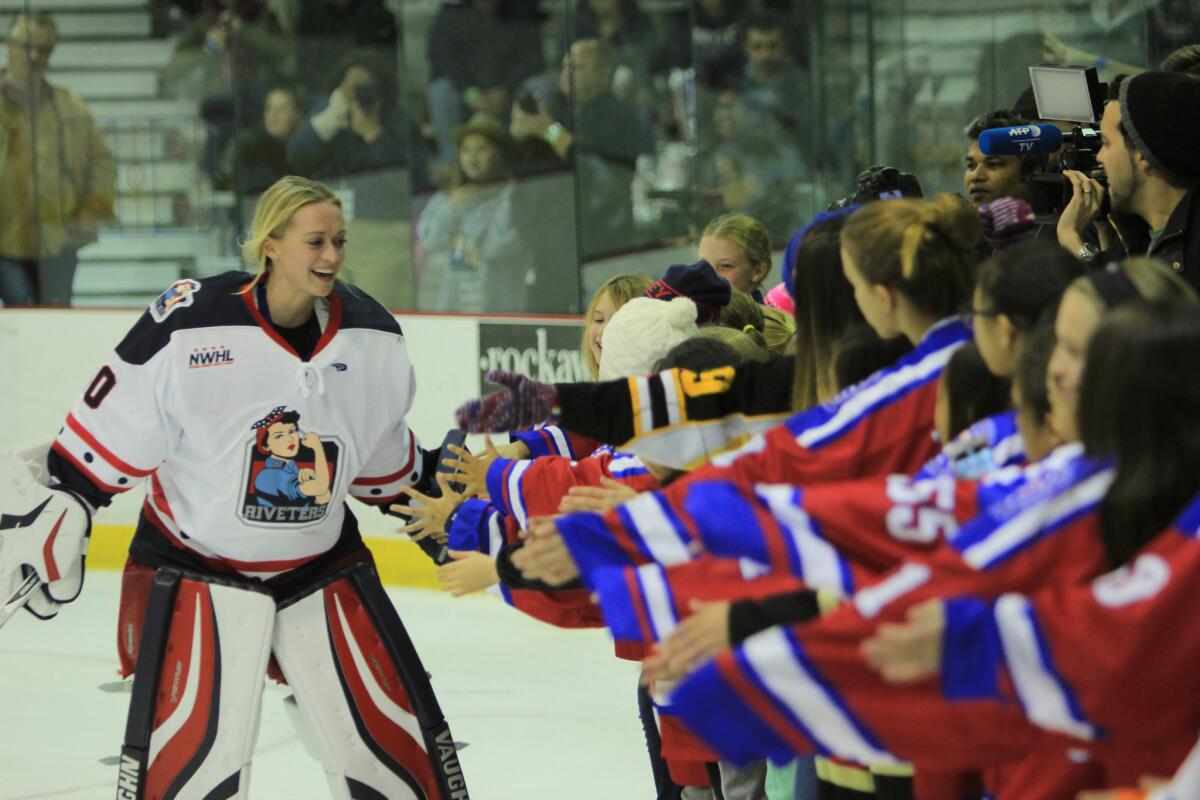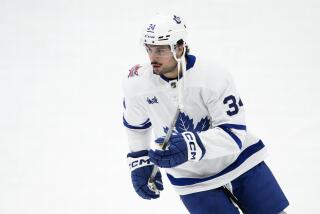New women’s hockey league is a real pro for players such as Jenny Scrivens

New York Riveters goalie Jenny Scrivens shakes hands with NWHL fans.
- Share via
Jenny Scrivens was so excited to get her first professional hockey paycheck that she immediately tried to document the occasion with a photograph.
“It was a blurry picture of me twirling around on my swivel chair at the office,” she said, laughing. “I think the moment is still sinking in and certainly the magnitude of getting paid to play hockey as a female athlete is still sinking in.”
Scrivens, a Camarillo native, played goal at Cornell, where she met her husband, NHL goalie Ben Scrivens. She thought her playing days were over and had turned to coaching and public relations work. The launch of the National Women’s Hockey League this season inspired her to unpack her pads and play for the New York Riveters while also working in the league’s communications office. It’s not just a labor of love: for the first time, female hockey players’ labor is generating paychecks.
The Canadian Women’s Hockey League predates the NWHL but doesn’t pay players. Players in the NWHL, which has teams in Boston, Buffalo, Connecticut and the Brooklyn-based Riveters, are being paid between $10,000 and $25,000. They also get a percentage from sales of jerseys that bear their names. Each team has a $270,000 salary cap.
The pay isn’t lavish, but it’s a start. League officials haven’t identified the sources of their funding except to say they’re private investors who see an untapped market for women’s hockey. The NHL is providing strategic and promotional help but no financial aid.
Scrivens said her husband, who’s playing for the Edmonton Oilers’ farm team in Bakersfield and played for the Kings in the 2013-14 season, has been supportive.
“When I first heard about the opportunity and found out there was still an opening on the team and I could move to New York and play, I thought, ‘Oh, my gosh, I’m married. I have a life, I have a career, all these sorts of things. Can I really up and move everything to New York and play hockey?’ ” she said. “He was the first person I ran this idea by and he was encouraging and thrilled and he said, ‘Absolutely, why not?’
“I can be away from my husband for six months, seeing him occasionally when our paths cross on some road trip. Six months out of our hopefully 60, 70 years together isn’t all that bad.”
The league has drawn many U.S. Olympians, including Hilary Knight, Brianna Decker, Kelli Stack and Kacey Bellamy, and players with U.S. national team experience. Two Russian Olympians and one Japanese Olympian also are playing. All NWHL players must have graduated from college.
“A lot of them were the best players on their college teams and they’re all coming together to play on four teams,” Scrivens said. “The level of play is better than what I experienced in college.”
Scrivens said she has heard from girls she coached, among them members of the 12-and-under Junior Lady Kings.
“They dedicate a lot of their time to training for hockey and right now their only goal is to play college hockey, which is great,” she said, “but if they can set another goal to play professional hockey and make a career out of it, that’s even better.”
Jiggs McDonald on the air
The success of the New York Mets has been a gift to hockey fans.
How’s that? The Mets’ march to the World Series means their radio voice, Howie Rose, can’t fill his other role as the TV play-by-play announcer of the New York Islanders. That opens air time for his fill-in, Jiggs McDonald, who was the original broadcast voice of the Kings in 1967 before he joined the Atlanta Flames and worked for the Islanders during most of their glory years.
“It’s kind of deja vu all over again,” McDonald said by phone from Florida.
McDonald, who did play by play on Kings simulcasts from 1967 to 1972, has sat in for Rose but not for this long. Although he will be 77 on Nov. 28, McDonald’s voice remains vibrant, his enthusiasm genuine and his descriptions insightful.
“It’s been a lot of fun,” he said. “It’s a good bunch of guys.”
By his count, he has called the first NHL game in seven arenas: the Long Beach Arena, the Sports Arena and the Forum with the Kings, the Pacific Coliseum for a Kings game at Vancouver, the Islanders at the Nassau Coliseum, at the Omni in Atlanta and Barclays Center in Brooklyn. His broadcast partner is Butch Goring, whom he met at the Kings’ 1969 training camp in Barrie, Canada. That’s mind-boggling.
“For both of us,” McDonald said. “All of us.”
McDonald hasn’t been to Los Angeles in a while but plans to share a special moment with Kings broadcasters Bob Miller and Nick Nickson in Florida next month. All have won the Hockey Hall of Fame’s Foster Hewitt Award for excellence in hockey broadcasting, McDonald in 1990, Miller in 2000 and Nickson this year.
“If they’re willing to travel with their Hall of Fame blazers,” McDonald said, “I’ll try and dig mine out and we’ll get a photo together.”
Slap shots
•With workhorse defenseman Duncan Keith out of the Chicago Blackhawks’ lineup for up to six weeks after surgery on his right knee, Trevor van Riemsdyk’s minutes have soared. He has been paired with Niklas Hjalmarsson, leaving Trevor Daley with David Rundblad and Viktor Svedberg with Brent Seabrook. The alternate captain’s “A” worn by Keith went to Marian Hossa.
•It was wonderful to see Barry Beck in Denver last weekend as the Avalanche introduced retro jerseys modeled after those worn by the city’s first NHL team, the Colorado Rockies. Beck, a fearsome defenseman in his prime, has been coaching in Hong Kong.
•Buffalo’s Evander Kane will sit out four to six weeks because of an injury to his left knee, but the forward won’t need surgery on the damaged medial collateral ligament. Kane, who has a goal and two assists in eight games, was injured in the third period of a Sabres’ loss to New Jersey on Saturday when he was checked by David Schlemko.
More to Read
Go beyond the scoreboard
Get the latest on L.A.'s teams in the daily Sports Report newsletter.
You may occasionally receive promotional content from the Los Angeles Times.






